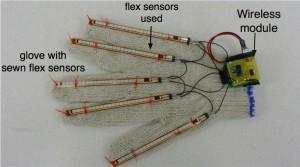 CSEE professor Nilanjan Banerjee has received a Microsoft Software Engineering Innovation (SEIF) Award. The award comes with a $25,000 grant to help fund a research project that uses inventive wearable computing devices to help paraplegics and quadriplegics get around their homes. It’s called “Wearable Multi-Sensor Gesture Recognition in Assistive Devices for Paralysis Patients”.
CSEE professor Nilanjan Banerjee has received a Microsoft Software Engineering Innovation (SEIF) Award. The award comes with a $25,000 grant to help fund a research project that uses inventive wearable computing devices to help paraplegics and quadriplegics get around their homes. It’s called “Wearable Multi-Sensor Gesture Recognition in Assistive Devices for Paralysis Patients”.
Dr. Banerjee’s proposal was chosen from a pool of more than one hundred. He joins sixteen professors and researchers across the world who are also 2013 SEIF recipients.
The aim of the Microsoft SEIF award is to advance software engineering applications and tools by funding researchers with state of the art ideas. Projects involving devices, services, cloud-computing, and applications based on natural user interface (NUI) are top priority.
Banerjee’s project speaks to this goal. The project proposes a gesture-based  system that will allow paralysis patients to do everyday household activities, like watch television, adjust the thermostat, and turn on a lamp. The heart of the system is two wearable devices. A headband with textile-based EOG sensors will capture eye movement. A glove with flex sensors and an accelerometer will capture hand gestures. Once collected, this data that will be analyzed with a smartphone, translating the wearer’s intent.
system that will allow paralysis patients to do everyday household activities, like watch television, adjust the thermostat, and turn on a lamp. The heart of the system is two wearable devices. A headband with textile-based EOG sensors will capture eye movement. A glove with flex sensors and an accelerometer will capture hand gestures. Once collected, this data that will be analyzed with a smartphone, translating the wearer’s intent.
Fellow UMBC professors Shaun Kane and Amy Hurst (Information Systems) were also among this year’s SEIF award recipients. Like Banejree, their project deals with improving accessibility for the handicapped. It’s called “Wheeltop Interaction: Full-Body Gesture Control for Power Wheelchair Users”.